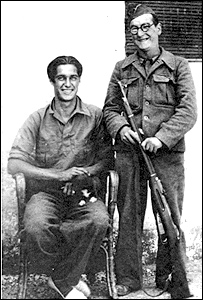Welsh miners and the Spanish Civil War

A Personal Memory: Hywel Francis MP
In amongst my father’s most cherished possessions was an undated letter from T E
Nicholas, the Welsh revolutionary poet. He wrote:
‘Dear Comrade, I arrived home safe. A nice journey, some fog on the Black
Mountains, but nothing to hinder me. When Tom Mann is there give my best regards.
I also enclose a sonnet in memory of the Welsh comrade who fell in Spain. Ask Tom
Mann to read it, and extend my sympathy to the family of the fallen comrade. If we
survive the end of the present crisis, I will see to it that a memorial in some form is set
up for the gallant Welshmen who fell in Spain....’
It ends:
‘I extend my hand [to Tom Mann] over the Black Mountains, and say ‘Here’s to the
new world for which you have worked; you have not worked in vain, the shrouds of the
victims of Franco have been glorified into the Red Flags in the blood of our class.
’Cofion gorau atoch oll; Yn gywir, for the Revolution in our time,
T.E. Nicholas’.
That meeting on 2nd October 1938 in the Dulais Valley was in memory of my father’s
friend Jim Strangward who had been killed in the Battle of the Ebro, in one of the last
engagements of the British Battalion of the International Brigades.
On 7th December 1938 the first all-Wales memorial meeting to the Welshmen who had
been killed in Spain was held in Mountain Ash and was addressed by the miners’
leader, Arthur Horner and Paul Robeson who said, ‘It is my duty to be here’.
I was born ten years after the outbreak of the Spanish Civil War but the received
memory from my father of those two meetings have been tremendously powerful
influences on me throughout my life and compelled me to record their experiences and
ultimately write the story of Miners Against Fascism.
As a child, these stories were reinforced by a letter from Jim Strangward, the memorial
programmes and the minutes of the Onllwyn Spanish Aid committee, all of which I
found in my father’s desk.
Whilst tracing the history of the Welsh miners who went to Spain I visited T E Nicholas
shortly before he died. I told him of the plans for a Welsh memorial and was told by
him and his son Islwyn that there was already a memorial, as he had promised in 1938.
The memorial had taken the form of equipment in Stalingrad hospital which they had
paid for by raising £260 through an all-Wales appeal in 1944 to commemorate the
sacrifices of Welshmen in Spain and the Red Army in the siege of Stalingrad. The
Welsh names were entered into the book of remembrance at the hospital.
0 comentarios